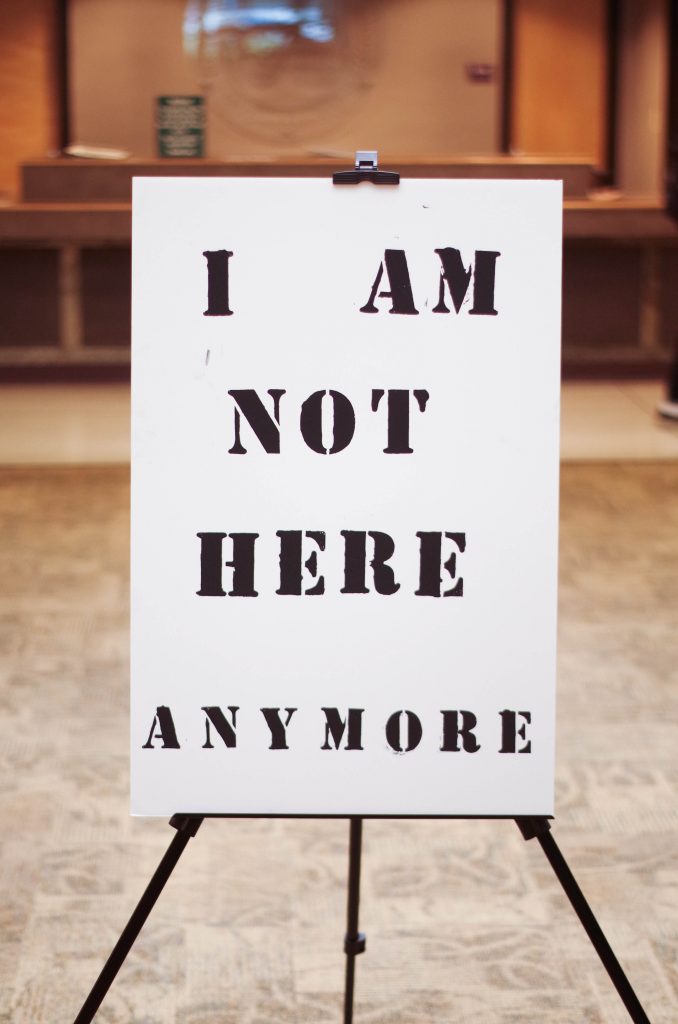
Students dressed in all black remained silent on Friday afternoon as they lined the walls and held signs in an attempt to bring attention to the violence, harassment and discrimination that the LGBTQ community faces on a daily basis.
The Day of Silence is a national student-led event developed by the Gay, Lesbian and Straight Education Network, originating from a 1996 protest at the University of Virginia. Participants take a vow of silence for the day to exemplify the silencing of LGBTQ voices and bring awareness to the infrequently discussed challenges that the LGBTQ community faces, such as employment and housing discrimination, homelessness and high rates of abuse and suicide.
The protest was organized by Binghamton University’s Q Center and lasted from noon to 4 p.m. Kelly Clark, director of the Q Center, said the structure of the event was changed to better fit a college environment.
“Some of our students may remember Day of Silence from middle or high school,” Clark wrote in an email. “Translating the day to college is a bit trickier, as we recognize that students may genuinely not be able to be silent for the day, [for example], in classes or work [or] internship environments, so [our protest] will be done a little differently.”
Instead of taking a vow of silence for the entire day, student volunteers signed up for 30-minute shifts of silence. Nadiya Al-Noor, the graduate assistant for programming and events at the Q Center and a second-year graduate student studying student affairs administration and public administration, said she believes it to be a more effective approach than the traditional Day of Silence.
“In my experience, I’ve always hated the Day of Silence,” Al-Noor said. “The purpose of the Day of Silence is to make people think and be aware of these things that are happening, but if you’re silent and don’t do anything else with that, it doesn’t really help. So we decided to say: ‘What’s a way to use silence to scream a message?’ So I thought, a protest where we can’t be missed, where people who go through a public place are going to be confronted with these messages, disturbed by them and think about that, ‘This is what my friends go through, this is what my loved ones go through, this is what my professors and co-workers go through.’”
The signs held by protesters included statements such as, “My parents think it’s a phase,” “My mom wishes I was dead instead” and “I have been homeless.” At the end of each shift, the sign was flipped to reveal a message: “I will not be silenced.”
“The sign a participant is holding may not reflect their personal reality,” Clark wrote. “But the phrases are based on the experiences faced by disproportionate numbers of LGBTQ people. The protest, deliberately held in an area with high traffic, is meant to confront those living in comfortable ignorance with the uncomfortable truth.”
In the middle of the lobby stood a sign without an attendant. This sign, which read “I am not here anymore,” represented the 40 percent of LGBTQ people who consider suicide.
Brian Warm, a junior majoring in business administration who participated in the protest, said the location of the event helped expose its message to people outside the LGBTQ community and incite a reaction from students, faculty and staff.
“People have been kicked out of their homes, they’ve been bullied in school, they’ve been kicked out of housing,” Warm said. “I think that events like this are very important because it shows the whole [BU] community what’s really going on, whereas when we just have events at the Q Center and things specifically catered toward the LGBTQ+ community, not everybody is involved.”
Zeguorney Khan, a senior majoring in biology, said she passed by the protest and felt it could inspire a lot of conversation about the discrimination LGBTQ people face.
“It’s really powerful,” Khan said. “LBGTQ people go through so much stuff that a lot of people don’t even realize. People shouldn’t have to suffer alone or in silence.”


